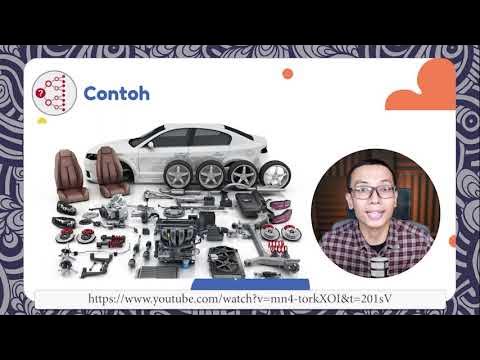Pengenalan Computational Thinking | Berpikir Komputasional
Summary
TLDRThis script introduces Computational Thinking, a problem-solving approach that is both efficient and effective. It emphasizes the importance of this thinking process in computer science and everyday life, from simple tasks like brushing teeth to complex issues like financial planning and career choices. The script outlines four fundamental principles of Computational Thinking: decomposition, pattern recognition, abstraction, and algorithm design. It also suggests practicing Computational Thinking through daily life applications and educational challenges, like the Bebras Indonesia competition, to hone these skills for the digital era.
Takeaways
- 💡 Computational Thinking is a process of thinking to solve problems effectively and efficiently.
- 💻 This way of thinking is used in computer science before starting to write code or programming.
- 🤔 Computational Thinking can be applied without a computer or internet, and is already used in everyday life.
- 🧩 Decomposition is the first foundation of Computational Thinking, which involves breaking down complex problems into smaller, manageable parts.
- 🔍 Pattern Recognition is the second foundation, which is about finding similarities and patterns among the parts of a complex problem.
- 🎯 Abstraction is the third foundation, focusing only on the important information and ignoring unnecessary details.
- 📝 Algorithm is the fourth foundation, which means creating a set of steps or rules to solve a problem.
- 🚀 Computational Thinking is crucial for facing complex life problems and the digital era of Industry 4.0 and beyond.
- 📚 You can sharpen your Computational Thinking skills by applying them to everyday problems and practicing with related exercises.
- 🏆 Participating in the Bebras Indonesia Challenge is a great way to practice Computational Thinking.
- 🧳 An example problem in the script involves arranging suitcases in a bus storage to make it easy to remove them at different stops, highlighting the practical application of Computational Thinking.
Q & A
What is Computational Thinking?
-Computational Thinking is a process of thinking to solve problems effectively and efficiently, often applied in computer science before starting coding or programming.
Can Computational Thinking be done without a computer or internet?
-Yes, Computational Thinking can be done without a computer or internet as it is a way of thinking that can be applied to everyday life activities.
How is Computational Thinking applied in daily life?
-It is applied in simple tasks such as brushing teeth, taking notes in class, and preparing a bag for school the next day.
What are some complex problems where Computational Thinking can be applied?
-Complex problems include managing monthly finances, finding one's way when lost in a new place, and choosing a major and career path.
Why is Computational Thinking important in the era of Industry 4.0 and beyond?
-It is important because it enables individuals to utilize the digital world for tasks such as finding and filtering necessary information and making important life decisions based on that information.
What are the four foundations of Computational Thinking mentioned in the script?
-The four foundations are decomposition, pattern recognition, abstraction, and algorithm creation.
What does decomposition mean in the context of Computational Thinking?
-Decomposition means breaking down a complex problem into smaller, more manageable parts to solve them more easily.
How is pattern recognition applied in Computational Thinking?
-Pattern recognition involves finding similarities and patterns among the parts of a complex problem to solve it more efficiently.
What does abstraction involve in Computational Thinking?
-Abstraction involves focusing on the important information and ignoring unnecessary details when solving a problem.
Can you provide an example of how an algorithm works in Computational Thinking?
-An example is given where a person is given a shopping list and must decide the most efficient way to collect items in a supermarket, such as starting with the items closest to the entrance and ending with those near the cashier.
How can one practice Computational Thinking skills?
-One can practice by applying it to everyday problems, solving practice problems in subjects like mathematics, Indonesian language, and IPAS within the Kurikulum Merdeka, and participating in the Tantangan Bebras Indonesia.
What is the example problem provided in the script related to a study tour bus?
-The problem involves helping a bus driver arrange the luggage of three groups of children going to different destinations so that it is easy to remove, and determining which group's luggage is placed in last.
What is the correct answer to the study tour bus problem in the script?
-The luggage of the group of children going to the museum is placed in last, as the museum is the last stop.
Outlines

Cette section est réservée aux utilisateurs payants. Améliorez votre compte pour accéder à cette section.
Améliorer maintenantMindmap

Cette section est réservée aux utilisateurs payants. Améliorez votre compte pour accéder à cette section.
Améliorer maintenantKeywords

Cette section est réservée aux utilisateurs payants. Améliorez votre compte pour accéder à cette section.
Améliorer maintenantHighlights

Cette section est réservée aux utilisateurs payants. Améliorez votre compte pour accéder à cette section.
Améliorer maintenantTranscripts

Cette section est réservée aux utilisateurs payants. Améliorez votre compte pour accéder à cette section.
Améliorer maintenantVoir Plus de Vidéos Connexes

Komputasional...

Kurikulum Merdeka Materi Informatika Kelas 7 Bab 2 Berpikir Komputasional

Informatika Kelas X Kurikulum Merdeka Bab 2: Berpikir Komputasional | Ngode with Kang Aldi

Kurikulum Merdeka : Informatika (SMA Kelas X) || Berpikir Komputasional

Gambar 1 11 Penyelesaian masalah dengan komponen utama computational thingking

Berpikir Komputasional dan Algoritma Pemrograman - Berpikir Komputasional - Informatika Kelas XII
5.0 / 5 (0 votes)
